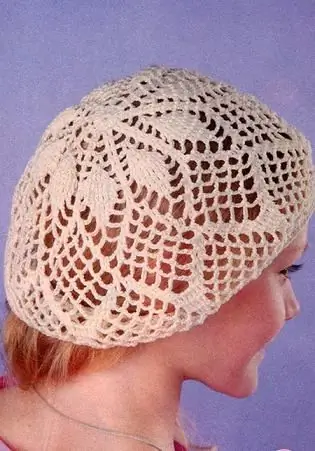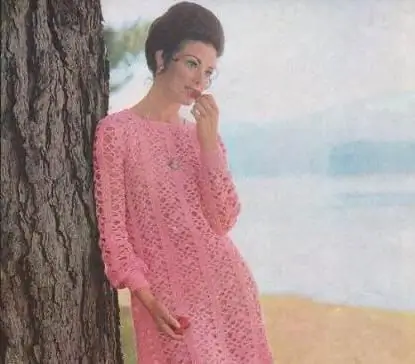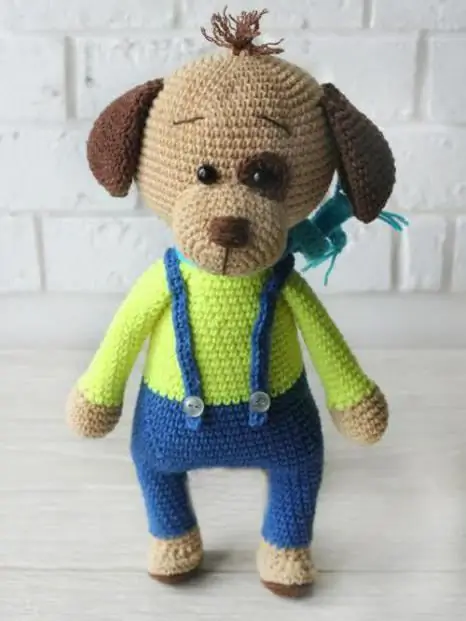
Table of contents:
- Author Sierra Becker becker@designhomebox.com.
- Public 2024-02-26 03:47.
- Last modified 2025-01-22 22:09.
A potholder is an item that every housewife's kitchen cannot do without. You can make it yourself in any way of needlework, the crochet hook is not left without attention. The pattern of her knitting can be both the simplest and the needlewoman requiring special skills. Crocheting is not only a pleasant pastime, but also always an interesting result. After all, a thing made by oneself always adds individuality and color to the interior.

Types and purpose of tacks
Of course, crochet remains the manufacturing priority. Tack schemes are presented today in large numbers. The shape of the product can be different: square, round, polygonal, in the form of animals, birds and many other objects. Basically, all patterns are carried out in a circle with a uniform addition of knitting elements, but there are other examples. The most elementary option would be a product made from elements such as a single crochet.
For tacks, it is better to use a thick or doubled thread, which willprovide sufficient web density. Because the oven mitt must withstand heat and protect your hands from burns, this is its main function. Do not use patterns with a large number of holes in such a product. And if you still decide to crochet potholders, the scheme and description of which imply an openwork pattern, then do them in two layers or seal them with a lining fabric. As a lining, you can use non-woven or cotton fabric.
Crochet potholders with patterns for beginners
It is advisable to take natural material for such work: cotton, linen, wool, because synthetic fibers will begin to melt under the influence of temperature. You can use threads of different colors, combining them into patterns. Get creative, it will make crochet more interesting. Tack schemes are now presented in large numbers. The remnants of yarn or thread obtained from old things are quite suitable as a material. The hook must be used at least number 4.

Square tack knitted in rows
The order of work is as follows:
- Knit 35 air loops to serve as the base.
- We start knitting a row from the first lifting loop and continue with single crochets.
- Turn the work and continue to knit a row similarly to the first. You should end up with 35 such rows.
- When the square is ready, we start tying. It is also performed with single crochets. In every corner loopwe knit three columns. To make a loop on which your tack will be hung, we make a set of chains of air loops. We also tie them with single crochets. Your oven mitt is ready.
After spending a small amount of time, you will get the necessary thing that will be very useful to you - this is a crochet potholder. The scheme assumes a square shape, so the number of loops and rows should be the same, but not necessarily equal to 35 (this value may vary).

Square tack made in a circle
The vast majority of products are knitted in a circle. Work begins in all cases according to the same principle, and then it is carried out according to an individual drawing. Consider crochet potholders with circular patterns. One of the simple options is performed according to the following rules:
- We pick up air loops, in this case four, and close with a ring.
- We carry out the first lifting loop and knit a row in this order: single crochet and 2 more loops. There should be four such combinations in a row. We close the row with a connecting column.
- All subsequent rows are performed in this sequence. We knit an instep, then in each loop of the bottom row we make 2 single crochets, between which there will be 2 air loops. And then 1 more air loop. We repeat this combination to the end. 1 stitch will be knit between all single crochets, and 2 at the corners (for proper rounding).
- Having reached the required size, we make an openwork edge: in the loop of the bottom row there are 2 single crochets and 4 loops.
Hexagon shape
Another option is a rectangular crochet potholder, the diagram of which is presented below. It is not difficult to make such a product, the main thing is to adhere to the presented scheme. A knitted tack will look no less impressive than the examples discussed above.

Having made a simple product with your own hands, you can start making more complex crochet potholders, the patterns of which you will understand without difficulty.

Watermelon slice
You will need four colors of woolen threads (red, white, green, black) from which the potholder will be crocheted. The scheme assumes the following sequence of work:
- Cast on five air loops and close them with a ring.
- We perform the first lifting loop, then we knit a row with single crochets. Be sure to end each row by connecting the beginning of knitting with the end of the connecting column.
- Next, we continue knitting with double crochets, doubling their number in each row. We finish each row with a connection.
- Having reached the required diameter, we start knitting the crust. We tear off the red thread and attach the white one. By analogy with the previous ones, we knit one row with white threads.

Potholder assembly - watermelon slice
Fold the knitting in half so that the initial loop falls on the fold. We carry out the edging, we connect the two halves together, but not along the entire semicircle. On one side of the slice, leave a passage for the hand. You can knit the edging simply with double crochets, or you can make it embossed. To do this, we knit three single crochets in one loop, and through one. At the end, we make a hanging part from air loops, which also needs to be decorated with single crochets. It remains only to embroider seeds with black threads.

Spiral product
Spiral shape is a rather unusual option. There is a special way in which we crochet potholders. There is no scheme for this option, you only need to follow the necessary sequence in the process of work:
- Take a blue thread and make a ring in the form of a sliding loop.
- Knit rise in 3 loops, then 3 double crochets. Increase the loop on the hook and remove it.
- Go to another color - take a beige thread and attach to the ring.
- Repeat the same as with the blue thread: 3 stitches with 3 stitches.
- Attach the remaining blue thread and repeat as with the previous ones.
- We continue knitting in the same color, under the blue lifting loops we perform double crochets in the amount of 4.
- Place 2 double crochets in the blue base loop. Pull the loop and leave.
- The same is repeated with blue and beige threads.
- Let's go onknitting with beige thread. Alternation is done in the following order: in the first loop of the base we make one double crochet, in the second - two.
- Knit further in the same sequence, alternating colors, until we reach the required size, now we move on to closing.
- We close each thread like this: we make 1 half-column with a crochet, 1 single crochet and 1 connecting.
Now it remains to tie the whole circle with a crustacean step and make a loop for hanging.
Recommended:
Openwork crochet: diagram and description. Openwork summer crochet

Do you want to crochet an openwork beret? The scheme and description of such a model are quite simple and do not require special knowledge and vast experience from the craftswoman. Floral hats are especially popular. They are suitable for fashionistas of any age. Berets with a stand are suitable for women with a round face, girls with an oval face type can knit any model
Crochet dress: diagram and description. Warm crochet dress, photo

A crochet dress, the scheme and description of which will be clear to every knitter, will become a luxurious wardrobe addition. It is easy to execute it. Even a beginner knitter will cope with this task. The most important thing is to carefully monitor the execution of the pattern and be patient
Crochet pillow: diagram and description. Crochet decorative pillows

Needlewomen create crocheted pillows of completely different shapes. They are square, round, cylindrical. Their size ranges from tiny to huge
Crochet lamb: diagram and description. How to crochet a lamb?

Use hypoallergenic yarn if you knit pillows, slippers, toys for children. If a crochet lamb is knitted for a rug or panel (the scheme is described at the beginning of the article), then you can take cheap threads that are sold on the market. The image can be anything, so you can create an author's scheme
Crochet dog - diagram and description, features and recommendations

Looking for a new pet for your knitted collection? A perfect addition to it will be a crocheted doggie, the scheme and description of which will be discussed in detail in this article
